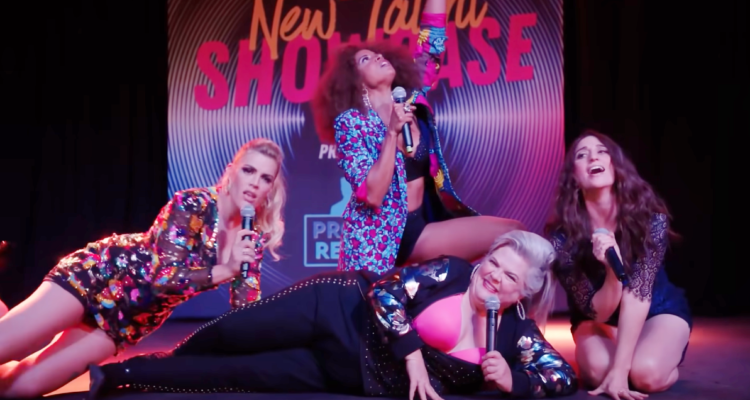At this point, you know what you’re getting when you dive into a comedy produced by Tina Fey and Robert Carlock (“30 Rock,” “The Unbreakable Kimmy Schmidt”): a spunky woman main character and an off-kilter group of eccentrics, all set in an alternate universe where name brand items and hit songs from our world are just off enough to be notable. “Girls5Eva” delivered on that promise in season one, giving us a reunited ’90s girl group full of dysfunctional relationships and — one of the other hallmarks of Fey/Carlock concepts — an undercurrent of darkness. Under the watchful eye of showrunner Meredith Scardino, that darkness bleeds into season two, embracing a world where Britney Spears is now free, and the horrors of how women artists in the ’90s and ’00s were treated is an unavoidable reality.
READ MORE: Summer 2022 TV Preview: Over 35 Shows To Watch
In the first season, Dawn (Sara Bareilles), Wickie (Renée Elise Goldsberry), Summer (Busy Phillips), and Gloria (Paula Pell) find themselves back in the spotlight after a rapper samples their song. After being invited to perform with him on the “Tonight Show,” they ultimately decide to get the group back together. Unfortunately, this decision lands them back among the characters from their past who wanted to control them, give them songs to perform, produce their work for them, and tell them how to look and act and post — basically, the same as any woman in the music industry, but funnier.
Season two resolves that drama with the group singing with Property Records, the Property Brothers label. Dawn is in place as the group’s songwriter; as the person badly in need of all the attention in the universe, Wickie solos on the album. The show does an interesting thing with the studio arc, introducing Ray (Piter Marek) as a kind-hearted producer picked by their label. Dawn pushes back hard against him, wanting to control everything herself. It sets up a recurring theme for the season where, rather than facing a system, the women are each the person in their own way. But this approach also sidesteps any examination of the systemic problem of why there are so few women producing records — and why so many women artists choose to work with male producers.
The side plots in the season — from Summer’s divorce to Gloria’s reunion with her wife (and general assholery) to Dawn’s control-freak tendencies to Wickie’s ugly foot saga — are funnier and more human than anything about the musical career of Girls5Eva. But unlike other workplace comedies from this group of producers, it feels like “Girls5Eva” is full of missed opportunities and misfires. The songs are still hilarious, reaching maximum absurdity. They do get a few amazing zingers and references in; highlights include a crack about former Arista Records head and “The X Factor” judge L.A. Reid and one unbelievably good joke about the stupidness of the name Jive Records (home to Britney, Backstreet, NSYNC — all the greats).
The show also continues to excel in its guest spots. Tim Meadows as himself (a.k.a. a featured recurring character on “The Goldbergs“) and John Lutz as a poor schlub Gloria repeatedly pranked on a Lifetime Extreme show are highlights, as is “Saturday Night Live” regular Heidi Gardner as a low-key sexist lawyer with a disturbing monologue. But nothing tops Mario Cantone (“And Just Like That,” “Sex & the City”) as himself, Wickie’s nemesis and the only person who ever bested her when she was singing. His incredulity at the situations and how they show up in an ultrarealistic version of New York City is almost enough to make you think the show jumped to another dimension.
But “Girls5Eva” keeps hinting at serious issues in the modern music industry without really addressing them. It would make more sense to lean into the absurdity a la “The Unbreakable Kimmy Schmidt,” but the show continues to insist upon a grounded Dawn — or perhaps the perceived normalcy of Bareilles takes that off the table. “Girls5Eva” faces a choice: it needs to commit to the bit and go completely off the rails with Wickie as the main character or find better ways to blend comedy with the pressing issues female artists face today. [B-]

